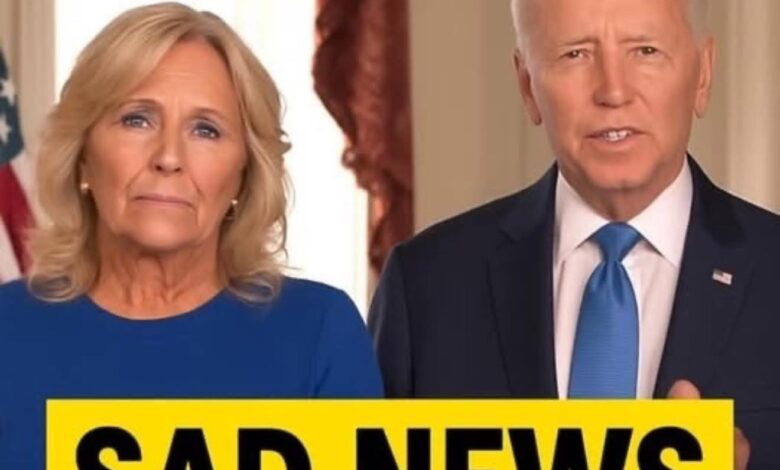Our thoughts and prayers are with Biden Family during these difficult times!

When President Joe Biden sat behind the Resolute Desk to speak directly to the American public, the moment felt heavier than a typical Oval Office address. No crowds. No stage lights. Just the weight of history and a president facing a choice larger than himself. For months, speculation simmered about whether he would remain in the 2024 presidential race. Now, he was ready to tell the country why he chose to step aside.
The camera showed him framed by portraits of Jefferson, Washington, Lincoln, and Roosevelt — men who led through crisis and forced the nation to confront what it stood for. Biden leaned on that legacy as he prepared to deliver the hardest political message of his career. This wasn’t a campaign speech. It wasn’t a celebration or a rally. It was a handoff — and a warning.
He didn’t start with numbers or achievements. He started with the core thing he believes still holds the country together: the idea that Americans remain decent at heart. “I love this country more than I love this office,” he said, his voice steady. Serving as president, he explained, had been the honor of his life. But moments arrive when personal ambition has to bow to a larger responsibility.
Biden framed his decision as part of a bigger fight — not one election, not one candidate, but a turning point for the country. He spoke bluntly about the stakes: democracy, decency, and the fundamental belief that citizens can disagree without treating each other as enemies. Throughout the speech, he returned to one phrase: “We the People.” For him, power has always belonged there, not in a title or a single administration.
He reminded listeners of the promises he made when he took office: to level with Americans, to defend democracy, to pull the country toward unity instead of division. And he didn’t shy away from acknowledging the obvious — the nation isn’t healed. But, he argued, it is better than it was, and he believes progress is real when measured not in headlines but in people’s lives.
Still, Biden didn’t pretend the past months had been normal politics. The pressure was clear. The divisions, too. In his words, the question looming over America isn’t just who wins elections — it’s whether the system itself survives. With that reality in mind, he said he had looked hard at what the country needs most. A new generation, he decided, deserves the chance to lead. A different voice might be what’s needed to keep the coalition protecting democracy strong and focused.
He made the move sound simple — it wasn’t. Presidents rarely step back voluntarily. But Biden framed the move not as surrender, but as duty. There is a time to lead and a time to pass the torch. In his view, this is the latter.
Even so, he made it clear his term isn’t over. The next six months, he said, will be spent working — not fading into the background. Lowering costs for families, protecting voting rights, defending civil liberties, and holding the line against extremism remain his priorities until his last day in office. The message was unmistakable: stepping out of the race is not the same as giving up the fight.
He addressed the moral tension tearing at the political landscape — whether Americans can still believe in fairness, truth, and respect in public life. He insisted those values still matter. They must matter, or the country will fracture beyond repair. In his eyes, the struggle isn’t left versus right. It’s democracy versus cynicism. Hope versus resentment. A future built by many versus a past designed for a few.
The speech wasn’t emotional in a dramatic sense, but it carried a quiet weight. Biden didn’t plead. He didn’t brag. He didn’t attack. He spoke like a man trying to leave the country better than he found it, even knowing half the nation will argue with his decisions forever. That’s the job. Every president inherits problems too big to solve completely, and every president leaves unfinished business. Biden made peace with that reality in real time, and he asked Americans to do the same.
More than once, he circled back to experience — his own and the nation’s. He acknowledged long service has value, but he also admitted that fresh voices matter. Young leaders bring urgency. Energy. New angles. He didn’t feign bitterness or resentment. Instead, he seemed to hope his departure would calm the water instead of stirring it further. Whether it will is another question.
He closed with promises: to keep governing, to keep pushing forward, to protect the country from political violence and hatred. He reminded people once more that defending democracy isn’t a slogan — it requires effort, unity, and sacrifice. That includes stepping aside when staying might fracture the coalition you helped build.
For supporters, the moment was bittersweet — a leader choosing country over campaign. For critics, it will fuel endless debate. For history, it becomes another instance where a president faced a crossroads and made a call knowing half the country would second-guess it forever.
But if you cut through the noise, the core message was simple: democracy survives when leaders choose responsibility over ego. Biden handed off the future not because he wanted to, but because he believed he needed to. And he did it by trusting the same people who put him in office — believing they still know the difference between chaos and progress, division and unity, hate and hope.
Whether the country proves him right remains to be seen. But the moment will hold. A president behind the Resolute Desk, saying goodbye not with bitterness, but with duty. Leaving the stage with one last appeal to what he believes Americans still are at their best: not perfect, not always united, but capable of rising to the moment when it counts most.